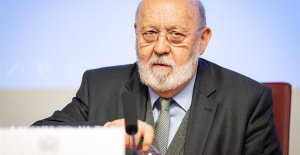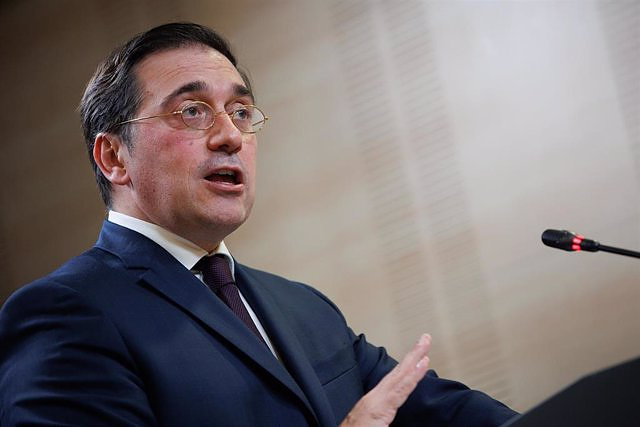Points to "an international consensus" on the impossibility of channeling economic aid through the Taliban
The Minister of Foreign Affairs, European Union and Cooperation, José Manuel Albares, reiterates that the international community "should not recognize the Taliban", although it has opted to "interact" with the fundamentalists "in very specific matters".
Albares has indicated during his participation in a round table on the situation in Afghanistan within the framework of the Munich Security Conference that among the issues in which there could be contacts is the delivery of humanitarian aid.
Thus, it has indicated that it must be guaranteed that humanitarian aid reaches the right people on the ground and not the combatants", as well as working to "try to create a space for women and girls", amid increasing restrictions against them. by the Taliban.
Albares has emphasized that there must be interaction with the Taliban to address "respect for Human Rights", as well as to "achieve the departure of our collaborators from the country".
"Spain spent 20 years in Afghanistan, until the last day that the Kabul airport operated," he recalled, while noting that the Spanish authorities managed to get 4,000 collaborators out of the country "thanks to the help of friends like Pakistan and Qatar".
In this way, Albares has emphasized the need to "interact" with the Taliban and "other countries in the region" to address the crisis in Afghanistan. "We cannot simply give up everything we have built for 20 years," he argued.
The Spanish minister pointed out that through development cooperation aid, schools and infrastructures were built to improve the situation of the population, while defending that "we must not accept that it is a parenthesis in the history of Afghanistan".
On the contrary, he has pointed to "a consensus" at the international level on the impossibility of channeling economic aid through the Taliban. "There is a consensus, he would say, on humanitarian aid that we have to ensure that it gets to the right people on the ground," she said.
"We are very aware that Afghanistan needs a certain amount of money to exist as a State," he stressed, before specifying that the problem stems from the absence of "adequate people" at the head of the country to manage these funds.
"That is the real problem," he said. "We want girls and boys to go to school," she said, before acknowledging that "if there is no money, they will not be able to go, not because the Taliban do not want to, but because the teachers cannot be paid." "Does this worry the Taliban? I think not. We are looking to square the circle," she lamented.
In addition, he has pointed to a "real consensus" that "Afghanistan is important for the Afghan people, but also for the region." "If Afghanistan destabilizes, Pakistan will suffer," she warned, before advocating helping the region, which passes for "helping Afghanistan, even with the Taliban inside."
In this way, Albares has indicated that "the most that can be done at this time" is to maintain a position "aligned with the UN", at the same time that he has outlined that "the Taliban do not give space for anything else".
"Once there is a minimum of security in Kabul, a discussion that we have within the EU, the EU and all member states want to return to help the Afghans. We must return together and united, almost like a united embassy," has apostilled

 Exploring Cardano: Inner Workings and Advantages of this Cryptocurrency
Exploring Cardano: Inner Workings and Advantages of this Cryptocurrency Seville.- Economy.- Innova.- STSA inaugurates its new painting and sealing hangar in San Pablo, for 18 million
Seville.- Economy.- Innova.- STSA inaugurates its new painting and sealing hangar in San Pablo, for 18 million Innova.- More than 300 volunteers join the Andalucía Compromiso Digital network in one month to facilitate access to ICT
Innova.- More than 300 volunteers join the Andalucía Compromiso Digital network in one month to facilitate access to ICT Innova.-AMP.- Ayesa acquires 51% of Sadiel, which will create new technological engineering products and expand markets
Innova.-AMP.- Ayesa acquires 51% of Sadiel, which will create new technological engineering products and expand markets The PP sees the concentration of support for Sánchez in Ferraz as a "failure" and believes that it "complicates" the story of its continuity
The PP sees the concentration of support for Sánchez in Ferraz as a "failure" and believes that it "complicates" the story of its continuity Marc Márquez returns to pole in Jerez
Marc Márquez returns to pole in Jerez The CIS carries out a quick survey on Sánchez's letter to measure the reaction of citizens
The CIS carries out a quick survey on Sánchez's letter to measure the reaction of citizens 12M.- Puigdemont to Sánchez and Illa: "This is not about the future of the PSOE! What have you believed?"
12M.- Puigdemont to Sánchez and Illa: "This is not about the future of the PSOE! What have you believed?" How Blockchain in being used to shape the future
How Blockchain in being used to shape the future Not just BTC and ETH: Here Are Some More Interesting Coins Worth Focusing on
Not just BTC and ETH: Here Are Some More Interesting Coins Worth Focusing on UPV students build a prototype of a wooden house to move to Equatorial Guinea
UPV students build a prototype of a wooden house to move to Equatorial Guinea The UA opens the call for the Impulso 2024 Awards for the best innovative business initiatives
The UA opens the call for the Impulso 2024 Awards for the best innovative business initiatives ALI, virtual assistant from Alicante, internationally recognized by the OECD
ALI, virtual assistant from Alicante, internationally recognized by the OECD Retrópolis brings the golden age of video games and computing to the UPV
Retrópolis brings the golden age of video games and computing to the UPV A million people demonstrate in France against Macron's pension reform
A million people demonstrate in France against Macron's pension reform Russia launches several missiles against "critical infrastructure" in the city of Zaporizhia
Russia launches several missiles against "critical infrastructure" in the city of Zaporizhia A "procession" remembers the dead of the Calabria shipwreck as bodies continue to wash up on the shore
A "procession" remembers the dead of the Calabria shipwreck as bodies continue to wash up on the shore Prison sentences handed down for three prominent Hong Kong pro-democracy activists
Prison sentences handed down for three prominent Hong Kong pro-democracy activists ETH continues to leave trading platforms, Ethereum balance on exchanges lowest in 3 years
ETH continues to leave trading platforms, Ethereum balance on exchanges lowest in 3 years Investors invest $450 million in Consensys, Ethereum incubator now valued at $7 billion
Investors invest $450 million in Consensys, Ethereum incubator now valued at $7 billion Alchemy Integrates Ethereum L2 Product Starknet to Enhance Web3 Scalability at a Price 100x Lower Than L1 Fees
Alchemy Integrates Ethereum L2 Product Starknet to Enhance Web3 Scalability at a Price 100x Lower Than L1 Fees Mining Report: Bitcoin's Electricity Consumption Declines by 25% in Q1 2022
Mining Report: Bitcoin's Electricity Consumption Declines by 25% in Q1 2022 Oil-to-Bitcoin Mining Firm Crusoe Energy Systems Raised $505 Million
Oil-to-Bitcoin Mining Firm Crusoe Energy Systems Raised $505 Million Microbt reveals the latest Bitcoin mining rigs -- Machines produce up to 126 TH/s with custom 5nm chip design
Microbt reveals the latest Bitcoin mining rigs -- Machines produce up to 126 TH/s with custom 5nm chip design Bitcoin's Mining Difficulty Hits a Lifetime High, With More Than 90% of BTC Supply Issued
Bitcoin's Mining Difficulty Hits a Lifetime High, With More Than 90% of BTC Supply Issued The Biggest Movers are Near, EOS, and RUNE during Friday's Selloff
The Biggest Movers are Near, EOS, and RUNE during Friday's Selloff Global Markets Spooked by a Hawkish Fed and Covid, Stocks and Crypto Gain After Musk Buys Twitter
Global Markets Spooked by a Hawkish Fed and Covid, Stocks and Crypto Gain After Musk Buys Twitter Bitso to offset carbon emissions from the Trading Platform's ERC20, ETH, and BTC Transactions
Bitso to offset carbon emissions from the Trading Platform's ERC20, ETH, and BTC Transactions Draftkings Announces 2022 College Hoops NFT Selection for March Madness
Draftkings Announces 2022 College Hoops NFT Selection for March Madness























